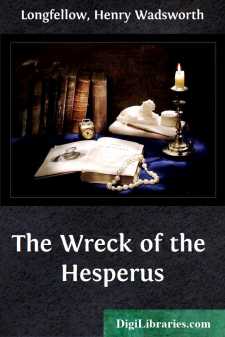Categories
- Antiques & Collectibles 13
- Architecture 36
- Art 48
- Bibles 22
- Biography & Autobiography 813
- Body, Mind & Spirit 141
- Business & Economics 28
- Children's Books 12
- Children's Fiction 9
- Computers 4
- Cooking 94
- Crafts & Hobbies 4
- Drama 346
- Education 46
- Family & Relationships 57
- Fiction 11826
- Games 19
- Gardening 17
- Health & Fitness 34
- History 1377
- House & Home 1
- Humor 147
- Juvenile Fiction 1873
- Juvenile Nonfiction 202
- Language Arts & Disciplines 88
- Law 16
- Literary Collections 686
- Literary Criticism 179
- Mathematics 13
- Medical 41
- Music 40
- Nature 179
- Non-Classifiable 1768
- Performing Arts 7
- Periodicals 1453
- Philosophy 64
- Photography 2
- Poetry 896
- Political Science 203
- Psychology 42
- Reference 154
- Religion 513
- Science 126
- Self-Help 83
- Social Science 81
- Sports & Recreation 34
- Study Aids 3
- Technology & Engineering 59
- Transportation 23
- Travel 463
- True Crime 29
The Wreck of the Hesperus
Description:
Excerpt
INTRODUCTION.
"Norman's Woe" is the picturesque name of a rocky headland, reef, and islet on the coast of Massachusetts, between Gloucester and Magnolia. The special disaster in which the name originated had long been lost from memory when the poet Longfellow chose the spot as a background for his description of the "Wreck of the Hesperus," and gave it an association that it will scarcely lose while the English language endures. Nor does it matter to the legend lover that the ill-fated schooner was not "gored" by the "cruel rocks" just at this point, but nearer to the Gloucester coast.
The poet has done many things well; and he has done few things better than this ballad in the quaint, old-time style, with its nervous energy and sonorous rhythm, wherein one hears the trampling of waves and crashing of timbers. Indeed, it is so well done, by art concealing art, that much of its force and beauty escape the careless reader; whereas, the thoughtful one finds in it an ever-increasing charm. It is worth noting that love, the usual ballad motif, is absent and is not missed. The almost human struggles and sufferings of the vessel, and the contrast between the daring, scornful skipper, and the gentle, devout maiden, in the midst of the terrors of storm and wreck, furnish abundant emotion and imagery; in truth, many of the lines are literally packed with color, movement, and meaning.
H. WINTHROP PIERCE,
EDMUND H. GARRETT,
J.D. WOODWARD,
W.F. HALSALL,
W.L. TAYLOR,
A. BUHLER,
H.P. BARNES,
A.J. LEWIS.
GEORGE T. ANDREW.
It was the schooner Hesperus
That sailed the wintry sea;
And the skipper had taken his little daughter
To bear him company.
Blue were her eyes as the fairy-flax,
Her cheeks like the dawn of day,
And her bosom white as the hawthorn buds
That ope in the month of May.
The skipper he stood beside the helm,
His pipe was in his mouth,
And he watched how the veering flaw did blow
The smoke now west, now south.
Then up and spake an old sailor,
Had sailed to the Spanish Main,
"I pray thee, put into yonder port,
For I fear a hurricane.
"Last night the moon had a golden ring,
And to-night no moon we see!"
The skipper he blew a whiff from his pipe,
And a scornful laugh laughed he.
Colder and louder blew the wind,
A gale from the north-east;
The snow fell hissing in the brine,
And the billows frothed like yeast.
Down came the storm, and smote amain
The vessel in its strength;
She shuddered and paused, like a frighted steed,
Then leaped her cable's length.
"Come hither! come hither, my little daughter,
And do not tremble so;
For I can weather the roughest gale,
That ever wind did blow."
He wrapped her warm in his seaman's coat,
Against the stinging blast;
He cut a rope from a broken spar,
And bound her to the mast.
"O father! I hear the church-bells ring;
O say, what may it be?"—
"'Tis a fog-bell on a rock-bound coast!"—
And he steered for the open sea....











